Eye For Film >> Movies >> Crimson Peak (2015) Film Review
Crimson Peak
Reviewed by: Rebecca Naughten

Those expecting gory horror and scares in Crimson Peak would do well to heed the early words of its heroine - "The ghost is a metaphor", ingenue novelist Edith Cushing (Mia Wasikowska) explains to a publisher who wrinkles his nose at her "ghost story" manuscript. Although there are shocks and no small amount of blood spilt, what Guillermo del Toro crafts is an opulent gothic romance in the vein of Jane Eyre or Rebecca rather than a by-the-numbers horror film.
In turn of the century Buffalo (New York), Edith - the daughter of self-made man Carter Cushing (Jim Beaver) and decidedly of the New World - finds herself unexpectedly falling in with visiting English aristocrats Sir Thomas Sharpe (Tom Hiddleston) and his sister Lady Lucille (Jessica Chastain, who walks off with the film), who are seeking funding for a steam excavation machine of Thomas' own invention. When Mr Cushing turns the Sharpes down - in part because something about them doesn't sit well with him - they turn their attentions to his only child, and a romance blossoms between Thomas and the independently minded Edith.

The gothic melodrama steps up several notches when Edith joins the siblings in Cumbria at their ancestral home, Allerdale Hall (Thornfield Hall or Maderlay by another name) - an ornate and beautiful monstrosity, and one that breathes and bleeds. Crimson Peak is the local nickname for the manse, sitting as it does on top of clay (which Thomas wishes to excavate) with the consistency of bloody wax - when winter sets in, the snow absorbs the colour of the clay, making the house look as if it is settled in a field of blood.
On their uppers, the Sharpes are fighting a losing battle to maintain their family home as it slides into dilapidation. The house appears a living entity both because of its geographical position (it is sinking into the squidgy deposits beneath it and the viscous run-off from the clay trickles down the walls, a harbinger of the blood-letting to come) and its rundown condition - the hole in the roof allows in a howling gale that converts into blood-curdling screams within its walls. But the house is also alive with memories and ghosts.
If a ghost is a metaphor as Edith suggests, here they stand for the past as manifestations or vestiges of a violence that refuses to be forgotten. Within del Toro's cinematic universes, ghosts are often revealed to have non-malign intentions (the living are usually more of a threat) - as in The Devil's Backbone, the phantasms in Crimson Peak wish to warn the protagonist of the danger around her and like the earlier film, they are rendered in a form that is both ethereal and corporeal (due to the director combining make-up and digital effects).
As ever with del Toro's films, this is a visual feast with sumptuous set designs and costumes where the level of detail and texture given to the world created is staggering. A primary colour coding system delineates the story through these elements in conjunction with expressively coloured lighting, with the warm burnished golds of the New World giving way to coldly lurid blues at Allerdale Hall before a final descent into red. The costumes likewise reveal character - the golds with which Edith is associated lose their lustre at Allerdale Hall and, alongside her increasingly wan complexion, the whiteness of her diaphanous and billowing nightgowns hint at the spectre that she is in danger of becoming.
For all its operatic excess, this feels like a film that has been crafted with love and great affection for its literary and cinematic antecedents. Although Crimson Peak links adult character to the experiences of childhood, it does not tap into a sense of primordial fear in the same way that The Devil's Backbone and Pan's Labyrinth did so memorably through their child protagonists. If this film doesn't reach the heights of del Toro's best work - and it is difficult to pinpoint what is missing, but there is something lacking in its depiction of fear and loss - it nonetheless demands to be seen on the biggest screen possible and stands as another fine cinematic spectacle by one of the most visually imaginative filmmakers currently working.
Reviewed on: 18 Oct 2015

















